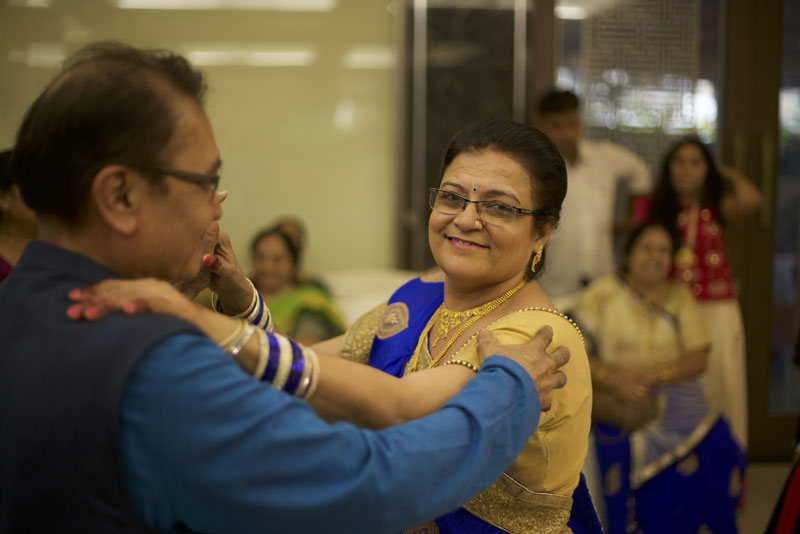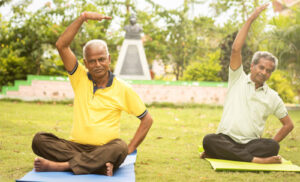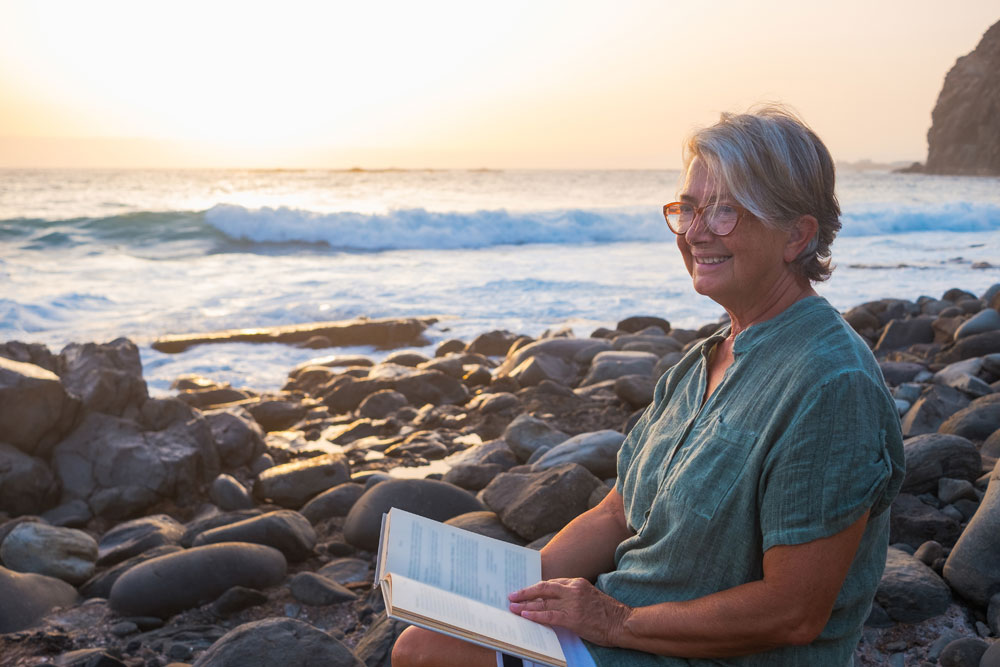When we discover ourselves, we are never desolate, writes Nagesh Alai
The other day, amid all the social distancing and isolation imposed by the pathogen, I had called up a septuagenarian lady living with her husband (a Parkinson’s patient) in our society, to enquire about her and asking her if she needed any help in getting vegetables, food, etc.
I had also called up a well-known retired cricketer neighbour in his seventies to enquire about him, and offering to get his vegetables and medicines since he was worried about stepping out. It was a simple neighbourly gesture and responsibility, but one could make out the immense happiness and gratitude they felt that someone would remember them, call up and offer help.
Similar was the reaction when a family member called up a nonagenarian widow (mercifully, in good health) living alone mid-town. Recently, a lawyer friend sought some references of an ayah (caretaker) to look after an elderly relative.
The common thread across is the acknowledgement of their existence, need for conversations and assurance of support in times of need.
Significant percentage

Anecdotes these are, but it is representative of a significant percentage of the approximately 130 million senior citizens of India – a split of about 70% rural and 30% urban. With the advances in medical sciences and increasing longevity, the seniors’ numbers is expected to more than double to 300 million in the not-too-distant future. Currently about 30% of the urban senior citizens continue to work for sustenance whereas in the rural areas, as much as 70% continue to work to sustain themselves. It can be safely assumed that overall 60%-plus of the elders are dependent on their children in one way or the other while the rest pull along or barely manage on their own in the sunset phase.
The breakdown of the joint family, particularly in urban areas, is an aggravation for the elders while the rural elders still have some solace from it. Several cases have been reported of elders’ abandonment, ill-treatment, destitution, etc. The few outlier exceptions of elder independence, monetary or otherwise, are a matter of good fortune.
Waking up to reality
As a society, the government and civil society are waking up to the reality of elder care. The Ministry of Social Justice and Empowerment is doing its bit, albeit a pittance of Rs 200 to Rs 500 monthly doles to BPL elders, based on advanced age. Lower tax rates, higher exemption levels and special high-interest deposit interest rates (elders also get 0.50% extra interest from all banks) are some important reprieves for the elders sustaining themselves on meagre pensions (save for government and PSU retirees and of course sinecured politicians who live a comfortable sunset life) and interest income.
Several NGOs focusing on geriatric and elders, across the length and breadth, are doing their bit for elder care, albeit penetration and impact is very low. Concessions in travel costs, elder friendly public infrastructure, Varishta Mediclaim Policy for elders in the age group of 60 to 80, LIC Varishta Bima Yojana guaranteeing a return of 8% for 10 years, senior citizen housing colonies, registration of all elders at local police stations, enactment of laws making ill treatment of parents a cognizable offence and mandating of state governments to establish at least one old age home in each district and similar conducive developments have all provided some mental, physical and psychological succour to the senior citizens.
Several on-line portals and start-ups offering home care to elders also help the elders in leading an assured stress-free life and more importantly a psychological booster of feeling cared for. The country is dotted with old-age homes, run by charities and missions, which take care of elders who have been abandoned or are in their terminal stage. Digital connectivity and social media help the outstation family stay in touch with their elders, adding to a degree of comfort.
Altering Perspectives
While our government is gradually and proactively taking steps and building capacities in that direction and the civil society and NGOs are doing their best, there is a need for the senior citizens as well to alter their own world view and perspectives. Let us address it from four different angles.

1) Psychological – Preparing ourselves for our retirement phase is a crucial aspect. All of us have been relating our importance in the grihastashram phase (family/working life) to our job, position, chair and earnings. Without these appendages of power and identity, we find it difficult to accept our situation and subconsciously devalue ourselves. Retirement from active life (it is a matter of detail if it is 60 or 65 or 75) is an inevitability and we have no option but to accept that.
Vanaprastha stage (or the retirement phase when people of yore used to move away to jungles to contemplate) is when you start sharing your wisdom and experiences and mentor others. You will find your former juniors earning more than you, reaching higher positions than you, leading a company, etc. Similarly, you may find your own children surpassing what you had achieved. You ought to be celebrating such successes and feel good at your own contributions to their achievement. Retirement calls for a lot of forbearance or what one would call as titiksa. At the end of the day, you have had your place under the sun in your prime and now you need to make space to let others enjoy their place under the sun. Without this positivity of mind and self-confidence, we may go down an abyss of depression. After all, life is a journey to be cherished from start to end regardless of our relative position.
2) Physiological – One of the greatest joys of life is to have good health and an active life. There could be only three possibilities – we are in good health, in average health or in poor health – all of which are a result of our past discipline (or indiscipline) in ingestion of food, regimen of exercises and lifestyle. While little can be done about our past indulgences or infractions, we can proactively look at how best to handle our current health situation and control and improve it. If you have diabetes or cholesterol, review and control food consumption, exercise and jog and keep your mental faculties active and alert. If you are a heart patient, be proactive in following the doctor’s advice and abide by it. If you have any joint or muscle pains, do exercises to alleviate it. If you have flexibility problems, do the stretching exercises.
Whatever be the case or the severity, be active as necessary and advised. Play games that you can handle – try being a child all over; you will be rejuvenated. Enjoy the hugs with your partner. Spend time with your family and friends. Travel, go an adventure trip, discover new places. Learn to dance, learn to sing. Whatever it may be, stay active. Old age is no excuse to stay inert.
I know of a runners group (aptly called the Zippers Club, denoting the surgical scar running down their chest; I was briefly a part of it till my right knee gave me a warning) consisting mostly of bypass patients in their late 60s and mid 70s practicing running regularly and participating in half marathons. That’s zest for life. That’s joie de vivre! Do you live life or let life just pass – it is up to you.
3) Financial – This is simply about the most complex part of our life – our finances – and how well one is equipped to handle it. Financial independence is obviously a good thing, but how many of us are lucky enough to have pension or sufficient savings. Are you managing whatever you have to ensure that it gets you some tax efficient returns to cover your inflation covered living costs. Do you consult an investment advisor? Do you do some research and homework yourselves? Do you review and revise your investments periodically? Have your spread your fixed deposits over several banks? How many of them are with PSU banks (for relatively better safety since they are majority owned by the government)? Do you spend too much on your credit card? Are you insured for medical and hospitalisation expenses? Investment decisions are not easy to make and there are no guarantees of safety of capital or returns. Cases like collapse of PMC bank, M S Coop Bank, etc., are dime a dozen, where people have lost their life time savings and left high and dry. The point is that we actively need to keep a close watch on our investments, the income that they generate, what are our expenses and what are the superficial ones that we can cut out, reducing life style expenses and saving for the future. Never hesitate to reach out to someone whom you trust. Yes, you heard me right – saving is necessary at every stage in life, given the longer life spans of people. Those who have the inclination can look at second careers too – many startups and portals offer full time or part time jobs to retired people. Most will have an average of 20 to 25 years of post-retirement existence and they need to make their finances stretch and work over that long phase. If it is any solace, you will be surprised to know that most of us can do with very little to survive, if health is good.
4) Spiritual – This is a long and a complex subject. We all had a beginning and we all will have an end. We all come into the world alone and will exit the world alone. Whether we are atheists, agnostics or theists, we all subconsciously know the law of nature. To encapsulate it briefly, it is about letting go, avoid coveting, having equanimity of mind, being detached and dispassionate, discovering our Inner Self and being prepared for the final passage. Meditation, yoga, spiritual discourses, satsangs, chanting – all of these help in achieving some inner peace of mind and confidence to face each day with renewed vim and vigour.
Life is a boon and it is up to each of us to make the most of it. A belief followed by practice is what will get us there. Since turning a senior citizen, the writer, for the first time in his life has done high altitude and physically challenging treks like Kailash Manasarover and Everest Base Camp, 4 Half Marathons and one 25 KMs Ultra run, learnt Vedanta and Sanskrit, tried dancing, has taught at alma mater, gives motivational talks and mentors start-ups. If the writer can do these, so can you! As they say, we are limited only by our mind.
When we discover ourselves, we are never desolate. Live life, Senior size!








